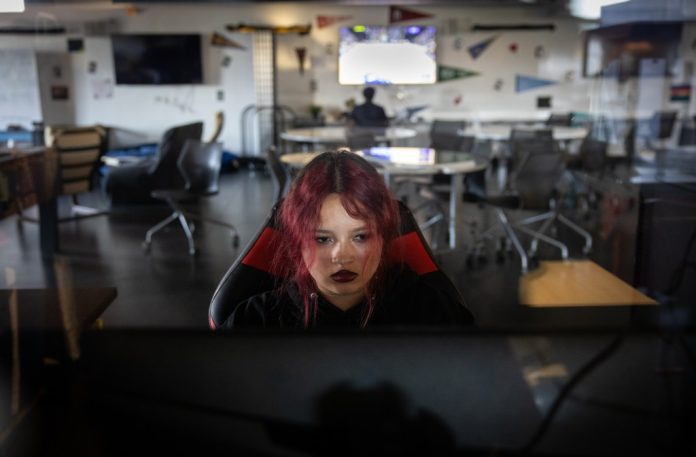Whenever Jessica Gonzalez plays the classic arcade game “Street Fighter,” she likes to be Chun-Li. The character is one of the few female fighters in the series and can shoot fireballs from her hands.
The 14-year-old Jessica had long enjoyed that and other games when some classmates asked if she’d like to play competitively. Joining an esports team meant she’d get to shoot fireballs at other schools. There was also a chance Gonzalez would be the only girl. But what ultimately got her to show up week after week was the bond she formed with her teammates.
“It was a place to have no judgement on us, and to have the support when we need it,” she said in an interview. “For me, it’s like another little family.”
Gonzalez is one of five students speaking this week at Comic-Con about their experience on the team. The panel, entitled, “How Video Games Are Changing the Lives of Students at Monarch High School,” is 5 p.m. Friday at the San Diego Central Library. (The convention has become so large that events are held throughout downtown.) The opportunity to talk at one of the planet’s biggest pop culture events would be notable for any teenager, yet this group has perhaps faced longer odds than most.
Monarch School serves families that have experienced homelessness, a population on the rise. During the last school year, San Diego County had 19,841 students who lacked stable housing, according to the California Department of Education. Fewer than 17,900 were tallied the year prior. In many cases, families are doubled up with others, sleeping on floors or couches, or bouncing from motel to motel, all of which can complicate an academic career, to say nothing of extracurriculars.
Around a dozen students have been on the Monarch Esports Team since it formed in 2023. Classes end early on Thursdays, allowing kids to trade the main Barrio Logan campus for the Linda Vista Innovation Center, where they practice and play in remote matches against other schools. The team is coached by Chris Garcia, San Diego County’s education technology coordinator. Their record last year was 3-5.
Super Smash Bros. is a favorite (Gonzalez likes being Samus from the “Metroid” games) as is Marvel Rivals (where her go-to is Cloak and Dagger). They’re generally not using headsets to chat with competitors, she said. The trash talking can get toxic. Instead, they focus on cheering for each other.
Yet the core of the program might be what happens before anyone picks up a controller. “We consistently have check-ins, and when someone was going through something, the other students and teacher would go to console them,” Gonzalez said. “We made a pact: Whatever was said there, stayed there.” She only missed two practices her freshman year.
There are also opportunities to play video games at school. On a recent weekday, Gonzalez walked into a large second-story room at Monarch. The area had the feel of a clubhouse. There was a tent, a foosball table and a young man hunched over a PlayStation 4. “Let’s go!” he shouted. A staffer said Monarch students are sometimes in charge of younger siblings when they’re out of class, so the space was meant to give everyone a breather.
Gonzalez approached a line of PCs. The computer towers were partially transparent, and white lights throbbed inside. She sat down and clicked on an icon labeled “Valorant,” the name of a tactical fighting game. A medieval-looking town appeared on screen. Gonzalez began to play.
